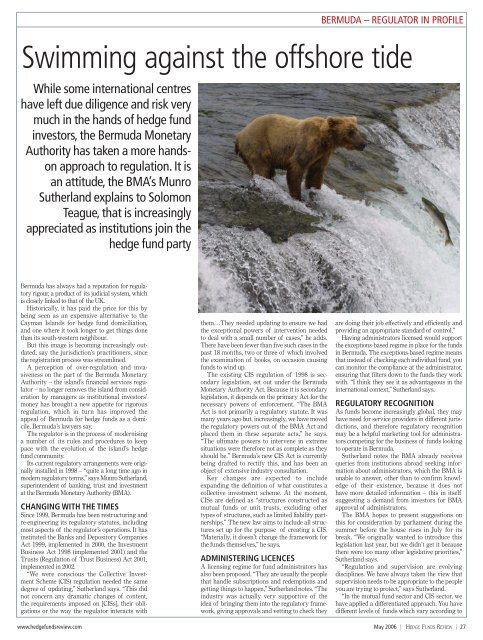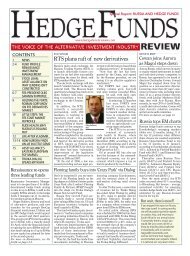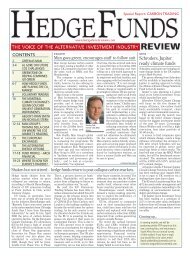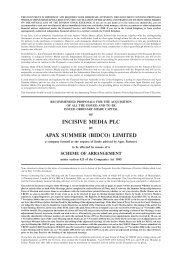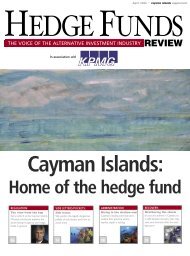BERMUDA – REGULATOR IN PROFILESwimming against the offshore tideWhile some international centreshave left due diligence and risk verymuch in the hands of hedge fundinvestors, the Bermuda MonetaryAuthority has taken a more handsonapproach to regulation. It isan attitude, the BMA’s MunroSutherland explains to SolomonTeague, that is increasinglyappreciated as institutions join thehedge fund partyBermuda has always had a reputation for regulatoryrigour, a product of its judicial system, whichis closely linked to that of the UK.Historically, it has paid the price for this bybeing seen as an expensive alternative to theCayman Islands for hedge fund domiciliation,and one where it took longer to get things donethan its south-western neighbour.But this image is becoming increasingly outdated,say the jurisdiction’s practitioners, sincethe registration process was streamlined.A perception of over-regulation and invasivenesson the part of the Bermuda MonetaryAuthority – the island’s financial services regulator– no longer removes the island from considerationby managers as institutional investors’money has brought a new appetite for rigorousregulation, which in turn has improved theappeal of Bermuda for hedge funds as a domicile,Bermuda’s lawyers say.The regulator is in the process of modernisinga number of its rules and procedures to keeppace with the evolution of the island’s hedgefund community.Its current regulatory arrangements were originallyinstalled in 1998 – “quite a long time ago inmodern regulatory terms,” says Munro Sutherland,superintendent of banking, trust and investmentat the Bermuda Monetary Authority (BMA).CHANGING WITH THE TIMESSince 1999, Bermuda has been restructuring andre-engineering its regulatory statutes, includingmost aspects of the regulator’s operations. It hasinstituted the Banks and Depository CompaniesAct 1999, implemented in 2000, the InvestmentBusiness Act 1998 (implemented 2001) and theTrusts (Regulation of Trust Business) Act 2001,implemented in 2002.“We were conscious the Collective InvestmentScheme (CIS) regulation needed the samedegree of updating,” Sutherland says. “This didnot concern any dramatic changes of content,the requirements imposed on [CISs], their obligationsor the way the regulator interacts withthem…They needed updating to ensure we hadthe exceptional powers of intervention neededto deal with a small number of cases,” he adds.There have been fewer than five such cases in thepast 18 months, two or three of which involvedthe examination of books, on occasion causingfunds to wind up.The existing CIS regulation of 1998 is secondarylegislation, set out under the BermudaMonetary Authority Act. Because it is secondarylegislation, it depends on the primary Act for thenecessary powers of enforcement. “The BMAAct is not primarily a regulatory statute. It wasmany years ago but, increasingly, we have movedthe regulatory powers out of the BMA Act andplaced them in these separate acts,” he says.“The ultimate powers to intervene in extremesituations were therefore not as complete as theyshould be.” Bermuda’s new CIS Act is currentlybeing drafted to rectify this, and has been anobject of extensive industry consultation.Key changes are expected to includeexpanding the definition of what constitutes acollective investment scheme. At the moment,CISs are defined as “structures constructed asmutual funds or unit trusts, excluding othertypes of structures, such as limited liability partnerships.”The new law aims to include all structuresset up for the purpose of creating a CIS.“Materially, it doesn’t change the framework forthe funds themselves,” he says.ADMINISTERING LICENCESA licensing regime for fund administrators hasalso been proposed. “They are usually the peoplethat handle subscriptions and redemptions andgetting things to happen,” Sutherland notes. “Theindustry was actually very supportive of theidea of bringing them into the regulatory framework,giving approvals and vetting to check theyare doing their job effectively and efficiently andproviding an appropriate standard of control.”Having administrators licensed would supportthe exceptions-based regime in place for the fundsin Bermuda. The exceptions-based regime meansthat instead of checking each individual fund, youcan monitor the compliance at the administrator,ensuring that filters down to the funds they workwith. “I think they see it as advantageous in theinternational context,” Sutherland says.REGULATORY RECOGNITIONAs funds become increasingly global, they mayhave need for service providers in different jurisdictions,and therefore regulatory recognitionmay be a helpful marketing tool for administratorscompeting for the business of funds lookingto operate in Bermuda.Sutherland notes the BMA already receivesqueries from institutions abroad seeking informationabout administrators, which the BMA isunable to answer, other than to confirm knowledgeof their existence, because it does nothave more detailed information – this in itselfsuggesting a demand from investors for BMAapproval of administrators.The BMA hopes to present suggestions onthis for consideration by parliament during thesummer before the house rises in July for itsbreak. “We originally wanted to introduce thislegislation last year, but we didn’t get it becausethere were too many other legislative priorities,”Sutherland says.“Regulation and supervision are evolvingdisciplines. We have always taken the view thatsupervision needs to be appropriate to the peopleyou are trying to protect,” says Sutherland.“In the mutual fund sector and CIS sector, wehave applied a differentiated approach. You havedifferent levels of funds which vary according towww.hedgefundsreview.com May 2006 | HEDGE FUNDS REVIEW | 27
BERMUDA – REGULATOR IN PROFILEthe perceived needs of the investor. In Bermuda,the overwhelming majority of our fund investorsare themselves sophisticated high-net-worthindividuals who need a much lower degree ofprotection from the regulator than in the caseof a retail fund.” The BMA is not interested incourting more retail business. “We have resistedany push towards retailisation. We are looking atproducts for institutional and professional investors,”he adds. Sutherland notes the extra regulationrequired to make the island more appropriatefor retail funds would bring a cost that would beshared by all. There is a limit to how far downthe road of retailisation the hedge fund industrycan go in any case, Sutherland says.“I don’t ultimately believe most hedge fundscould convert themselves into retail-type operations,in terms of risk management, risk controlsand limitations on their trading profiles.” However,via funds of hedge funds, the retail model isa more comfortable fit, he says.FUND ASSESSMENTThe BMA attempts to appraise a fund first byassessing the strength of its support structure.The quality of the service provider is investigated,collectively and on an individual basis.The BMA asks, on aggregate, “whether a brandof service providers in relation to a product givesa reasonable certainty of delivering the checksand balances necessary to give a reasonablefront-line defence to investors,” says Sutherland.“In the context of schemes that are essentiallyprofessional and non-public, as is a large part ofour market, you move from a system of havingdone your heavy-duty fund vetting of people anddocumentation to an exceptions-based regime.The regulatory structure ought to be able todeliver the right quantum of security and oversight,with protection of the investors’ assets,”Sutherland says.“Bermuda has always gone to enormouslengths to understand people who wanted tomake use of the jurisdiction,” Sutherland says.“Unlike most other jurisdictions, you can’t justgo to a lawyer and say: ‘Here’s an applicationand money, go to the registrar of companies andincorporate a company.’ You need to get consent,which comes through the BMA conducting a vettingprocess.”Sutherland is happy to see the island’s hedgefund community continue to grow. Physical restrictionsof space on the island limit Bermuda’s abilityto welcome large businesses due to office space,parking and ancilliary requirements of large numbersof employees.However, hedge funds, which usually take uplittle physical space or resources, cause no suchproblems. The BMA, therefore, welcomes newcomersto the island, as long as they prove themselvesto be “fit and proper” people.The question of who constitutes a ‘fit andproper’ person to set up a hedge fund is decidedon the basis of a checklist of considerations.Directors, promoters, and service providersfrom custodian through to investment advisorsand auditors are screened to see if they havebeen involved in problems with the BMA before.Prospective funds are checked against applicationsthe BMA has received over the past 50years as well as against a list of businesses thathave been active on the island.This is supplemented by internet searches,which is scoured for references to the applicant.“Most applicants already act in some capacity foran existing Bermuda fund,” he notes.If they have been meeting their obligations,they will be in a strong position to qualify forregistering a new fund. In other instances, therehave been issues; for example, a failure to fulfilreporting obligations on a timely basis. “Wemight ask why, if they cannot meet their existingreporting obligations, we should give them anymore,”explains Sutherland.The BMA wants to minimise the intrusivenessand visibility of its presence to fund managers.“Ultimately, we are relying on the auditors andservice providers as being there and delivering aservice to protect the investors. We are the ultimateback-up when things go wrong.”EYES AND EARSSutherland agrees the island’s service providersact as one set of eyes and ears of for the regulator,though it does not rely on them as the only sourceof information, also garnering details from investors,and conducting searches itself. Checks areconducted on managers, especially newcomers tothe island’s hedge fund industry. The BMA willalso follow up on press articles if there are problemsreported.Investigations are carried out in response tospecific concerns among investors, who oftencome to the BMA if they encounter problems witha fund they are invested in, or if they suspect aproblem. However, such instances are infrequent.The BMA seeks to know as much as possibleabout hedgefunds based on theisland in terms oftheir track records,strategy and backgrounds.A regulator is ina much better positionto oversee theindustry if it hasa clear understanding of the mechanics of theunderlying strategies of the funds it regulates,Sutherland notes.It must be able to read the signs, such as whena fund has made money in a market where itwould not be expected to, or if it has lost moneyin a favourable environment, and whether this isdue to bad luck or the manager deviating from hisstated investment strategy.“If you get your due diligence right to beginwith, you should be in a position where any problemsare localised and are few in number,” he says.“You’ll never avoid every problem. Somethingwill always go wrong, someone will cut a corner,someone with a previously good track record will“We are relying on the auditors andservice providers as delivering a serviceto protect the investors. We are theultimate back-up when things go wrong.”turn bad, and someone will succumb to temptation.There is always a risk, and you need to havethe tools to deal with that.”Although Sutherland says the model of regulationin Bermuda works, he concedes there has beena need to change the regulatory environment.“There has been evidence of an excessivedegree of informality and a lack of clarity on thepart of some investors, and of a lack of willingnesson their part to hold hedge fund managersto account, which is a concern.“Ultimately, we are leaving these people totheir own devices, putting in place a basic frameworkof support and intervention but tellingthem they should not come bleating to the regulatorif it all goes wrong,” Sutherland says.“It’s like with corporate governance generally,where shareholders do not always hold their fiduciariesproperly to account. <strong>Hedge</strong> fund managershave sometimes got away with a little bit toomuch latitude, where investors would have beenbetter advised to have held them more firmly toaccount,” he says.NOBODY EXPECTS THE SPANISHINQUISITION...This lack of willingness is shifting, he notes,partly through the institutionalisation of thehedge fund investor base – although even theyhave been susceptible to believing in the Midastouch of certain managers, he says, who havesuffered from theresulting fear ofrocking the boatby bothering themwith queries thatmight be construedas criticisms.“It’s like Enron.Everyone knew,looking at thenumbers, that there were risks being taken somewhere.[If not, then] how is this black-box deliveringthese returns?“But people didn’t want to ask,” he adds.“We’ve now seen the wheels come off some ofthese things, seen the shine come off some ofthese high-flying managers, people are startingto ask the right questions.“The managers need to demonstrate not justto the investors but to their intermediaries theyhave a solid structure of governance in place.”This development, Sutherland says, has beenuseful and has yet further to run, though it remainsto be seen what implication this loss of gloss willhave on the further growth of the industry.THE EUSD – A THREAT NULLIFIEDWhile some of Bermuda’s south-western neighbours – notably the Cayman Islands – agreed to implement the EU SavingsDirective, but then negotiated wide-ranging exemptions for funds from its obligations, Bermuda did not agree to implement itthrough its local laws.The problems this brought “were not in any sense foreseen,” says the BMA’s Munro Sutherland.The Directive, introduced in Brussels in July 2005, was not expected to involve Bermuda, and there was surprise from manywhen it was interpreted that funds with paying agents in the EU, or even countries with agreements with the EU pertaining tothe Directive, were suddenly implicated.Before Bermuda’s recent negotiations with Swiss authorities, Bermuda-regulated funds that conducted business throughSwiss paying agents were required by Swiss law to disclose information about savings income of EU citizens. Bermuda’sGazette newspaper estimated 80 funds vacated their Bermuda domicile at least partly as a result.Under renegotiated terms with Switzerland, funds exempted from Bermuda’s CIS Regulations 1998 would be “out ofscope” of the EU Savings Directive in Switzerland.“In the end, it went through very quickly, it was brought into place late 2005, but it had been under discussion with theindustry most of the previous quarter,” Sutherland adds. “It’s the model we were moving towards in the new structure anyway,with the regulation of fund administrators,” Sutherland says. He feels it is a good structure for hedge funds.“There is no doubt the kind of funds we are talking about were never intended to be caught out by the EUSD. The industrynever believed it for a moment,” says Sutherland. However, lacking clarity over to whom the statute applied, all Bermudafunds had been left in a state of uncertainty.28 | HEDGE FUNDS REVIEW | May 2006 www.hedgefundsreview.com


